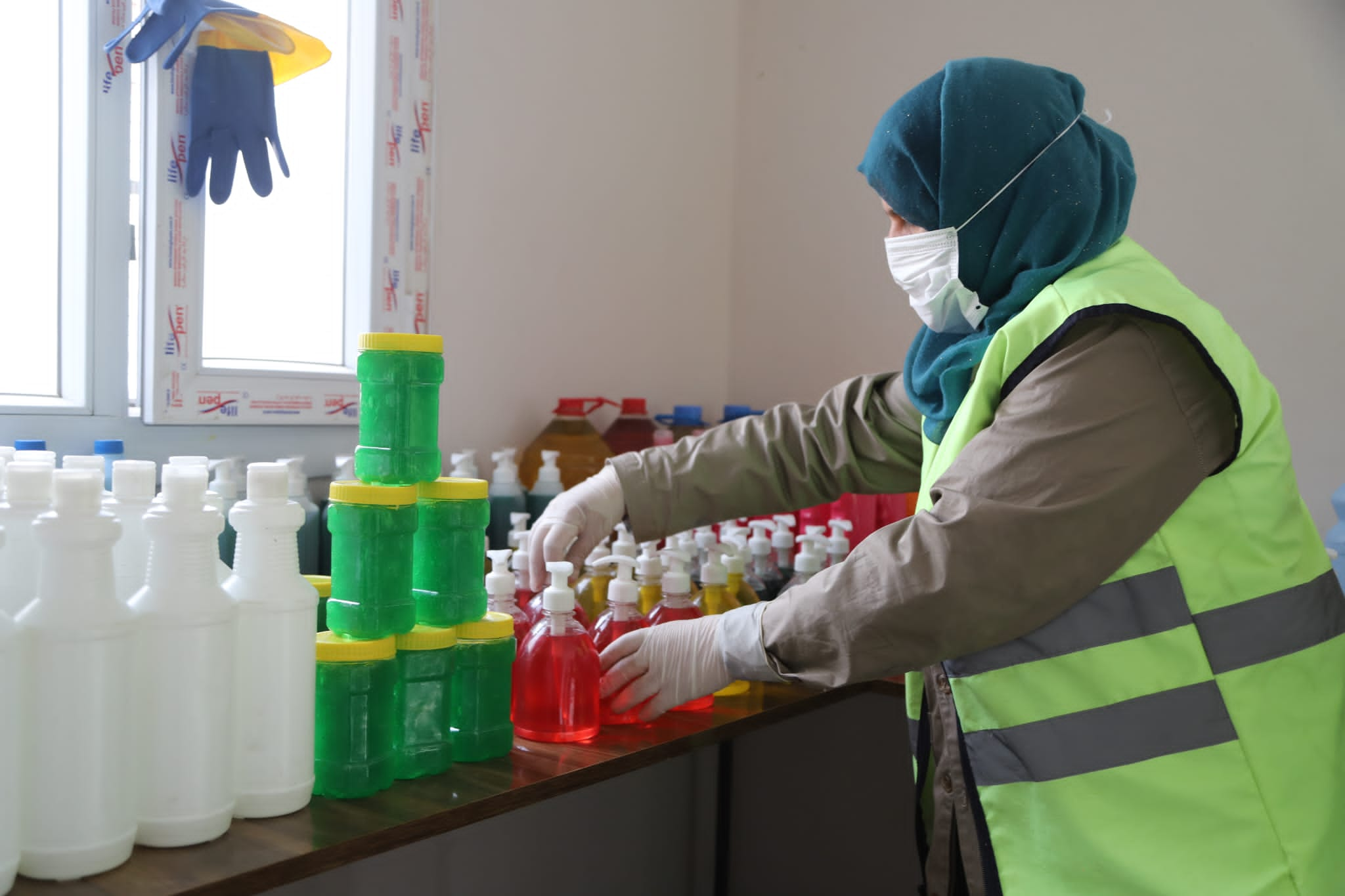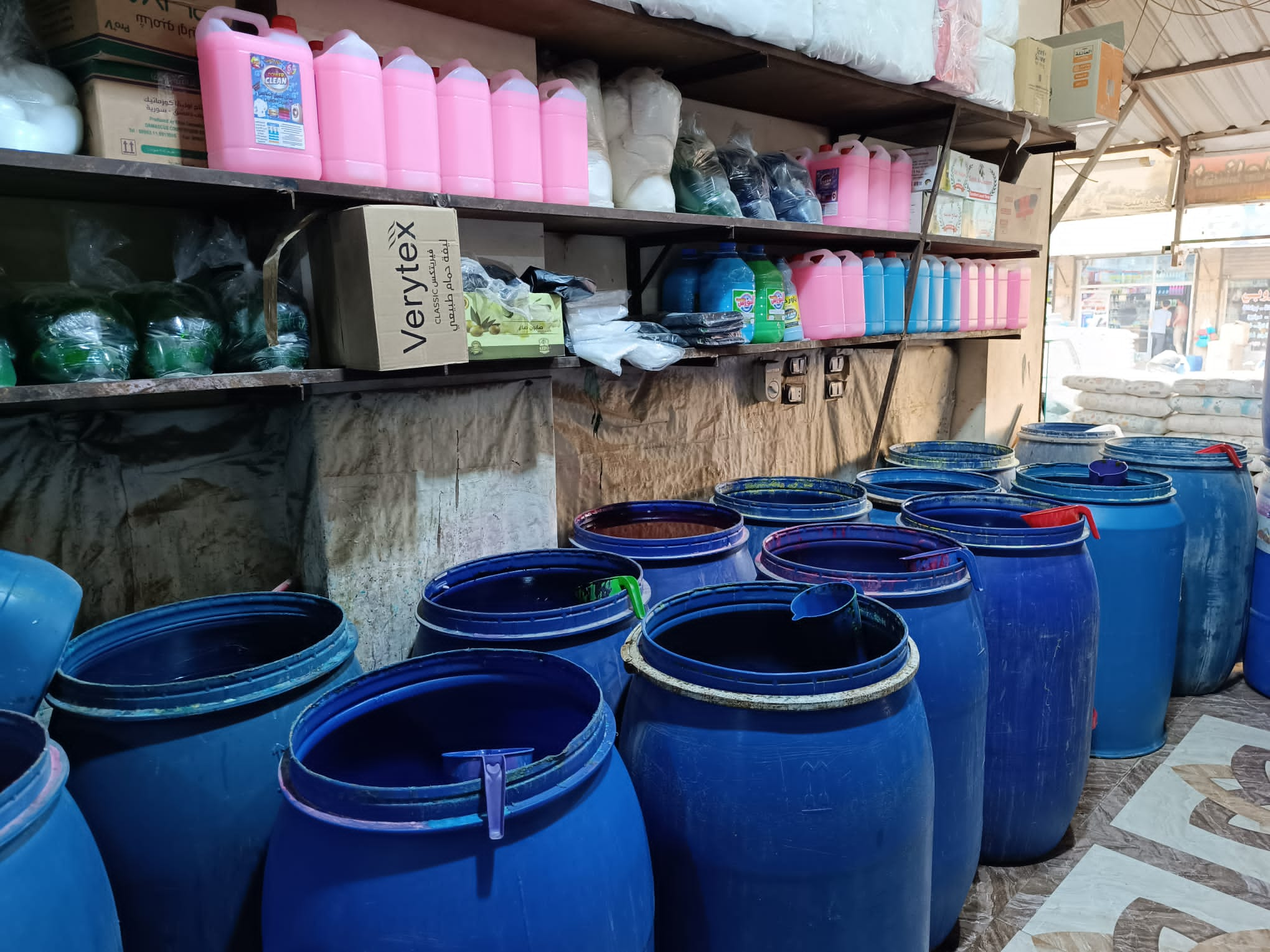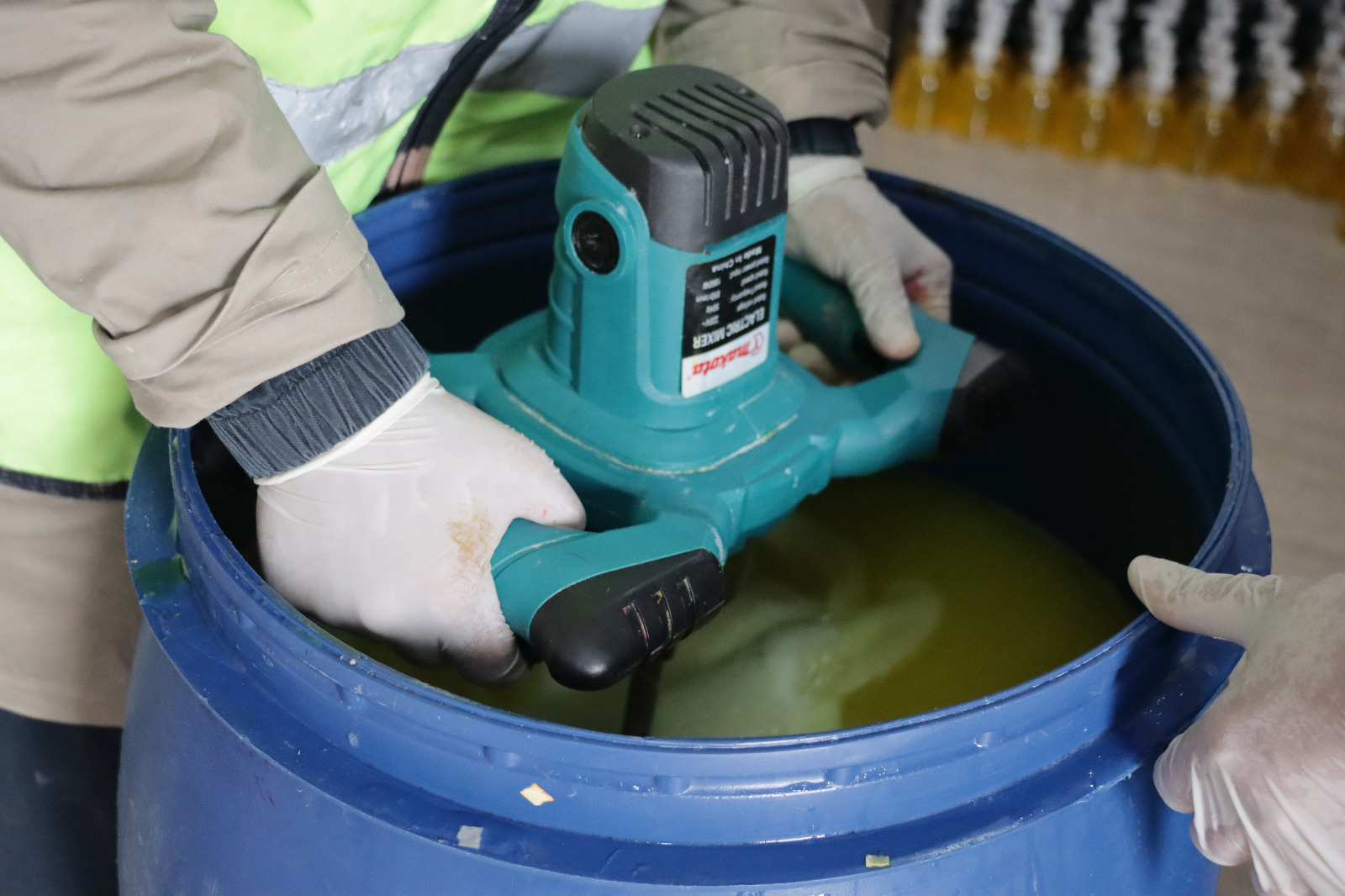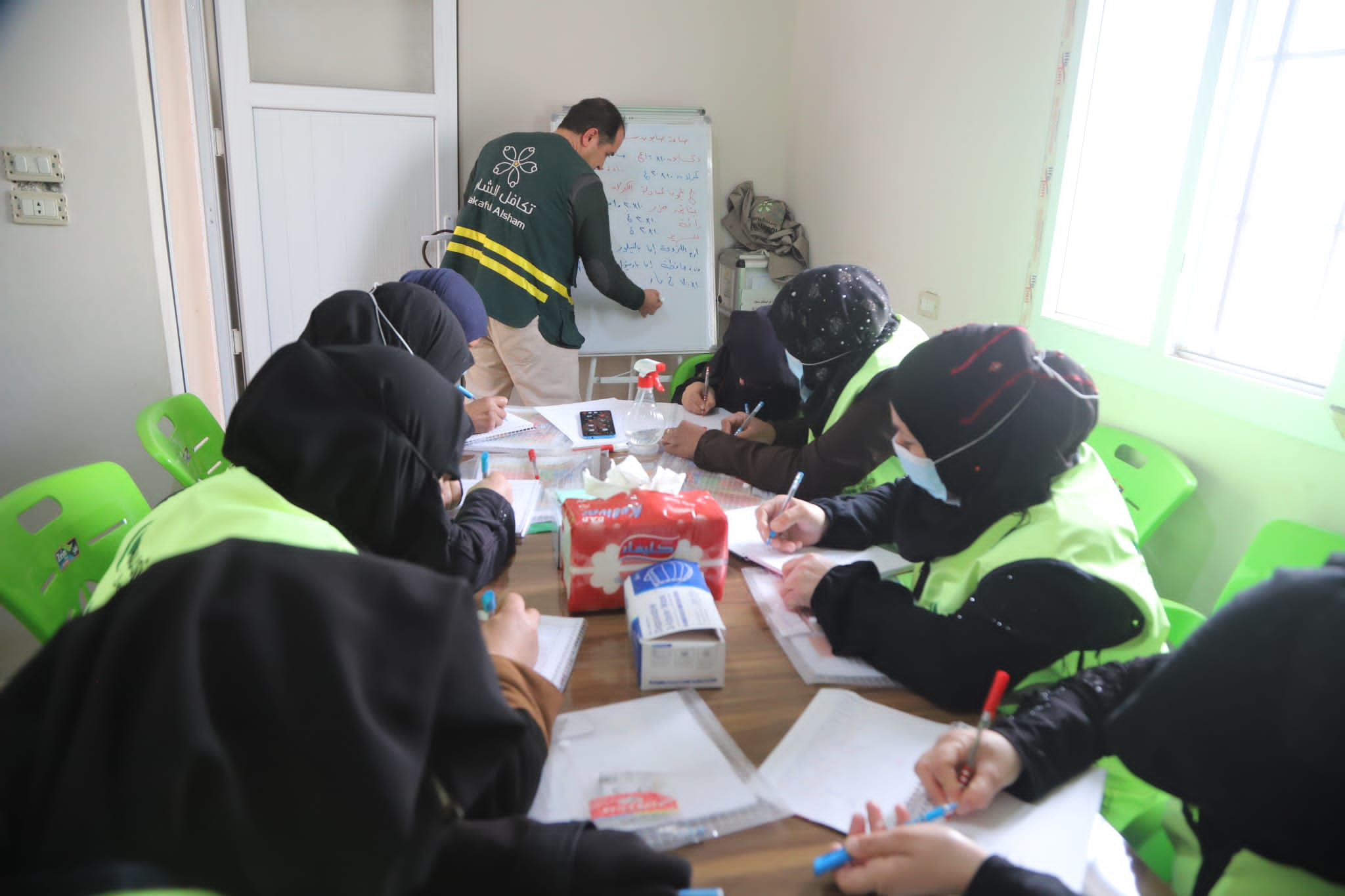“This article was produced within the project «Empowering the Next Generation of Syrian Women Journalists» in partnership between the «Syrian Female Journalists Network» and «UntoldStories». This article was produced under the supervision of journalist Marwa Al-Ghafari.”
“People envy us for the scent of cleanliness that emanates from our home, and they do not know the harm it causes. I wish I could find another job so that my children would never need help from anyone," says Um Fatima in a low voice, interrupted by coughs and long breaths. She speaks about the process of making cleaning products, which she relies on to earn a living for her family after her husband passed away, and the responsibilities on her shoulders increased. Um Fatima, who lives in the village of Al-Abzamo in the western countryside of Aleppo with her seven children, did not expect that her work in manufacturing cleaning products would lead to respiratory diseases that could turn into chronic conditions for both her and her daughter.
Fatima's mother recounts an incident involving her daughter when she unintentionally left a bottle of ammonia, a pungent-smelling substance used in detergents, open in the house. "Suddenly, I saw my daughter lying on the ground, struggling to breathe. The ammonia slipped from my mind entirely, and I felt a deep fear for my daughter. She was gasping for air. I rushed out of the house, screaming for the neighbors to assist me in getting her to the hospital."
In her modest home, Umm Fatima produces substantial quantities of cleaning products like dish soap, laundry detergent, and chlorine without having a dedicated space for this manufacturing process. Due to financial constraints, she relies on a hand mixer instead of specialized equipment. Fatima reveals: "Using chemicals like acid, sodium hydroxide, and chloroform in detergent production, substances with potent odors, led to the development of asthma that will persist throughout my life."
Health Impacts
“Every time I make detergents at home, I suffer from shortness of breath for ten days due to the strong smells,” shares Maryam, 48 years old, a resident of the town of Qah in the countryside of Idlib. She resides in a small house with her family, comprising a husband and three daughters, which receives minimal sunlight. The overpowering scents of strong detergents permeate her home.
Maryam opens up about her struggles, which mirror those of other women who have taken up the profession of manufacturing household cleaners. She started doing this job four years ago with her husband, aiming to generate income for her family and meet the essential needs of life. Speaking in her fatigued voice, accompanied by constant panting due to asthma, Maryam explains: “I use sodium hydroxide in the production of detergents, along with perfumes and ammonia. I manually mix the materials, lacking an electric machine, which compels me to touch the substances. Certain detergent types require stirring for an hour or two, incorporating materials sequentially, leading to the release of a potent odor resulting from the interaction of these substances.”
Maryam not only struggles with asthma; the chemical reaction of substances also causes skin irritation, potentially leading to ulcers and peeling. This compels her to sacrifice a portion of her modest earnings each time to purchase medical ointments for treatment.
Maryam gestures towards large barrels in the living room's corner, where she keeps the materials used in detergent production or products before filling. With a sigh, she laments, “We live surrounded by the persistent scent of these materials. Life is costly, with no job opportunities or alternatives to this profession.”
Dr. Fares Ahmadou, a respiratory disease specialist, affirms that inhaling chemical odors poses significant harm to the human body, particularly the respiratory system. In cases of substantial inhalation, it may even lead to loss of consciousness. He emphasizes the crucial step to be taken if someone is exposed to chemical smells, especially those associated with cleaning product manufacturing: is to promptly remove the affected person and relocate them to a clean, well-ventilated area.
In a relevant context, Mr. Mustafa, an applied chemistry degree holder from the University of Aleppo, explains that most materials used in the manufacturing of cleaning products pose significant dangers. Substances like sodium hydroxide, salt spirit, and chloroform, among others, can lead to lung irritation and skin burns.
Mustafa emphasizes the critical importance of maintaining appropriate proportions of these materials, ensuring they are neither increased nor decreased. The composition must be meticulously adjusted to avoid acidity or alkalinity, ensuring safety for individuals, even those with skin conditions.
He underscores the necessity of adhering to a manufacturing uniform, typically a nylon suit, and wearing a mask and gloves designed to withstand exposure to chemicals. These preventive measures are essential when working to ensure the health and safety of the body.
Dr. Fares also warns against manufacturing without precise knowledge of proportions and advises not to purchase random detergents with unknown origins and compositions.
According to statistics from the Syrian American Medical Society (SAMS) in opposition-controlled areas in Syria, 47 cases of poisoning by fumes and gases, 221 cases of poisoning with unknown substances, and 327 cases resulting from drug poisonings and medical chemicals were treated from the beginning of the year until the end of November 2023.
Housewives Use Homemade Cleaning Products
After asking thirty women about their reliance on homemade cleaning products and licensed products from factories, it was clear that 75% of them purchased cleaning products made at home. The most commonly used items include washing powder and dish soap. These jobs have become widely spread due to the ongoing war conditions, a substantial increase in detergent prices, and widespread unemployment.
In comparison between the prices of cleaning products manufactured in licensed factories and those produced domestically, it appears that licensed dish soap from a well-known brand is sold in local markets for one US dollar, as the package contains less than a kilogram, while one kilogram of homemade dish soap is sold for $0.3.
Concerning washing powder from the same local market, two kilograms were valued at three dollars, while a kilogram of homemade washing powder was sold for $0.6. This pricing extends to most cleaning and personal care products.
This was affirmed by Mrs. Atika Al-Qassim, a resident of the town of Killi. “I've been purchasing homemade cleaning products for over two years because they are more affordable. I've observed that the efficacy of these products varies from one seller to another concerning their cleaning effectiveness.”
Atika further mentions that after washing the dishes, she notices redness and cracks on her hands. “Initially, I thought I might be using too much dish soap for better cleaning results, but after I started using gloves while doing laundry or washing dishes to avoid direct contact with cleaning materials, I realized that it was the cause of the redness."
Employment and Training Opportunities
The organization "Takaful Al-Sham" initiated a specialized project for women in Al-Nour camp aimed at teaching them how to manufacture detergents. The project commenced in mid-September of the previous year and continued for approximately nine months. According to project official Omar Al-Badawi, "Ten women were selected without any prior experience in detergent manufacturing. The selection criterion was based on the women's urgent need for income-generating work amid challenging living conditions. The detergent manufacturing training included theoretical instruction and practical experience, with the work team consistently accompanying the participants. Upon completion of the training, the organization provided the necessary materials, tools, clothing, raw materials, and containers."
Al-Badawi emphasizes that the project was not solely educational; the organization's team actively monitored women throughout the production, packaging, and marketing processes during and after the project's completion. Ongoing follow-up is conducted through periodic visits as per the withdrawal plan.
The team also followed security and safety methods and procedures concerning the selection of the working location, ensuring it has adequate ventilation. Women were equipped with a solar energy system and fans for each workshop room, along with work uniforms, masks, and gloves for personal protection against chemical odors.
Small Factory Project
Facing the challenges of a high cost of living and limited job opportunities, Musab Akkar opened a small shop in the town of Abzimo in the western countryside of Aleppo, focusing on the production and sale of detergents. He emphasizes that mastering and precision are crucial in this profession, which he inherited from his brother.
Musab desires to expand his shop into a factory that produces various types of cleaning materials, “because it is a sustainable profession with high demand in the market.”
Addressing the standards applied in the detergent industry, Musab explains: "Cleaning products must have an expiration date, and each substance requires a specific preservation method. For instance, powders are stored in elevated places, away from moisture, while liquids are kept in areas shielded from sunlight and cold."
However, due to the economic constraints, Musab resorts to packing the products he manufactures for the residents of the region in nylon bags. Although these bags are not ideal for long-term chemical storage and are intended for temporary use, the high cost of dedicated detergent containers forces him to adopt this approach. The manufactured materials are stored inside large barrels for convenience in terms of size and durability.
Competition Between Factories and Homemade Cleaning Products
During our visit to detergent factories in the town of Tal Al-Karama, we came across a cleaning product manufacturing facility located near a residential area, evident from the widespread scent of fresheners in the surroundings. Upon entering the factory, it became apparent that approximately 10% of the workforce consisted of children under the age of eighteen. Moreover, about 50% were female workers, and we observed no preventive measures employed by both male and female workers. They were without gloves, masks, or specific work attire. The responsibilities of male and female workers were divided among manufacturing, packaging, wrapping materials, and loading finished products onto distribution vehicles.
We also explored another factory licensed for manufacturing cleaning products in the city of Dana. Mr. Walid, the owner of the factory, shared: "We face the challenge of the high costs of raw materials sold in dollars, compelling us at times to sell products at a minimal profit to ensure the continuity of operations."
He also affirmed the use of protective masks and gloves during the mixing of materials to shield workers from chemical reactions that may arise in the production of detergents. However, when packing materials like dish soap or laundry detergents, they are handled without gloves since they pose no harm and are not prone to interactions at this stage.
Walid uses dedicated bottles for packaging cleaning products, on which he notes the product's name and expiration date.
It is noteworthy that numerous bottles and bags of homemade cleaning products are scattered in popular markets and small stores, lacking labels detailing the composition or materials of these cleaners, and often missing an expiration date. Despite this, these products experience high demand due to their affordability, especially when compared to those from licensed factories. This demand encourages more women to embrace this profession, enduring the challenges they encounter, as a means of securing their livelihoods. Fatima expressed this sentiment with optimism and teary eyes, stating: "The scent of detergents remains more appealing than the scent of poverty. Despite all the challenges, I am committed to enhancing my profession and providing products that meet people's needs. It is a tax every woman aspiring to live with dignity has to pay."











